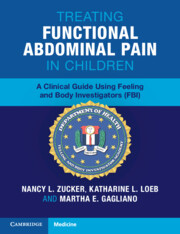 Treating Functional Abdominal Pain in Children
Treating Functional Abdominal Pain in Children Book contents
- Treating Functional Abdominal Pain in Children
- Treating Functional Abdominal Pain in Children
- Copyright page
- Dedication
- Contents
- Acknowledgements
- Part I The Background Science Behind Feeling and Body Investigators
- Part II A Session-by-Session Guide to Feeling and Body Investigators
- Chapter 6 Session 1: Initiation into Feeling and Body Investigators
- Chapter 7 Session 2: The Eats
- Chapter 8 Session 3: The Explosions
- Chapter 9 Session 4: The Zoomies and the Shakies, Part 1
- Chapter 10 Session 5: The Blahs
- Chapter 11 Session 6: The Ouchies
- Chapter 12 Session 7: The Drowsies
- Chapter 13 Session 8: The Zoomies and the Shakies, Part 2
- Chapter 14 Session 9: The Soothies
- Chapter 15 Session 10: The Celebration… and the Next Leg of Our Journey
- Part III Sample Workbook Pages, Handouts, and Additional Resources for Feeling and Body Investigators
- Index
Chapter 6 - Session 1: Initiation into Feeling and Body Investigators
from Part II - A Session-by-Session Guide to Feeling and Body Investigators
Published online by Cambridge University Press: 18 November 2023
- Treating Functional Abdominal Pain in Children
- Treating Functional Abdominal Pain in Children
- Copyright page
- Dedication
- Contents
- Acknowledgements
- Part I The Background Science Behind Feeling and Body Investigators
- Part II A Session-by-Session Guide to Feeling and Body Investigators
- Chapter 6 Session 1: Initiation into Feeling and Body Investigators
- Chapter 7 Session 2: The Eats
- Chapter 8 Session 3: The Explosions
- Chapter 9 Session 4: The Zoomies and the Shakies, Part 1
- Chapter 10 Session 5: The Blahs
- Chapter 11 Session 6: The Ouchies
- Chapter 12 Session 7: The Drowsies
- Chapter 13 Session 8: The Zoomies and the Shakies, Part 2
- Chapter 14 Session 9: The Soothies
- Chapter 15 Session 10: The Celebration… and the Next Leg of Our Journey
- Part III Sample Workbook Pages, Handouts, and Additional Resources for Feeling and Body Investigators
- Index
Summary
This chapter is where the action starts! We provide a step-by-step guide for clinicians to lead the introductory session for FBI including sample dialogues and examples of how to integrate the therapeutic materials provided (e.g. parent/child workbooks, worksheets, and coloring pages). Therapists are given accessible language to present the case formulation of visceral hypersensitivity as a collection of sensory superpowers that enable children to experience the world and their bodies through a lens of curiosity and excitement rather than fear. Children and parents begin their training as body detectives, Feeling and Body Investigators that harness these superpowers. Children create a “Body Map” a tracing of the child’s body that summarizes the many wisdoms of the body. Children are introduced to their first body characters. Examples include Henry Heartbeat, Samantha Sweat, and Gassy Gus. Children perform their first Body Investigation, a Henry Heartbeat exploration in which they compare strategies to raise and lower their heartbeat. A resulting body wisdom might be: my heart is smart- it knows to beat faster or slower depending on what I need. Body Brainstorms worksheets facilitate generalization of new learning to the outside world. Families are given home-based practices and worksheets to reinforce what they learn.
Keywords
- Type
- Chapter
- Information
- Treating Functional Abdominal Pain in ChildrenA Clinical Guide Using Feeling and Body Investigators (FBI), pp. 43 - 53Publisher: Cambridge University PressPrint publication year: 2023


